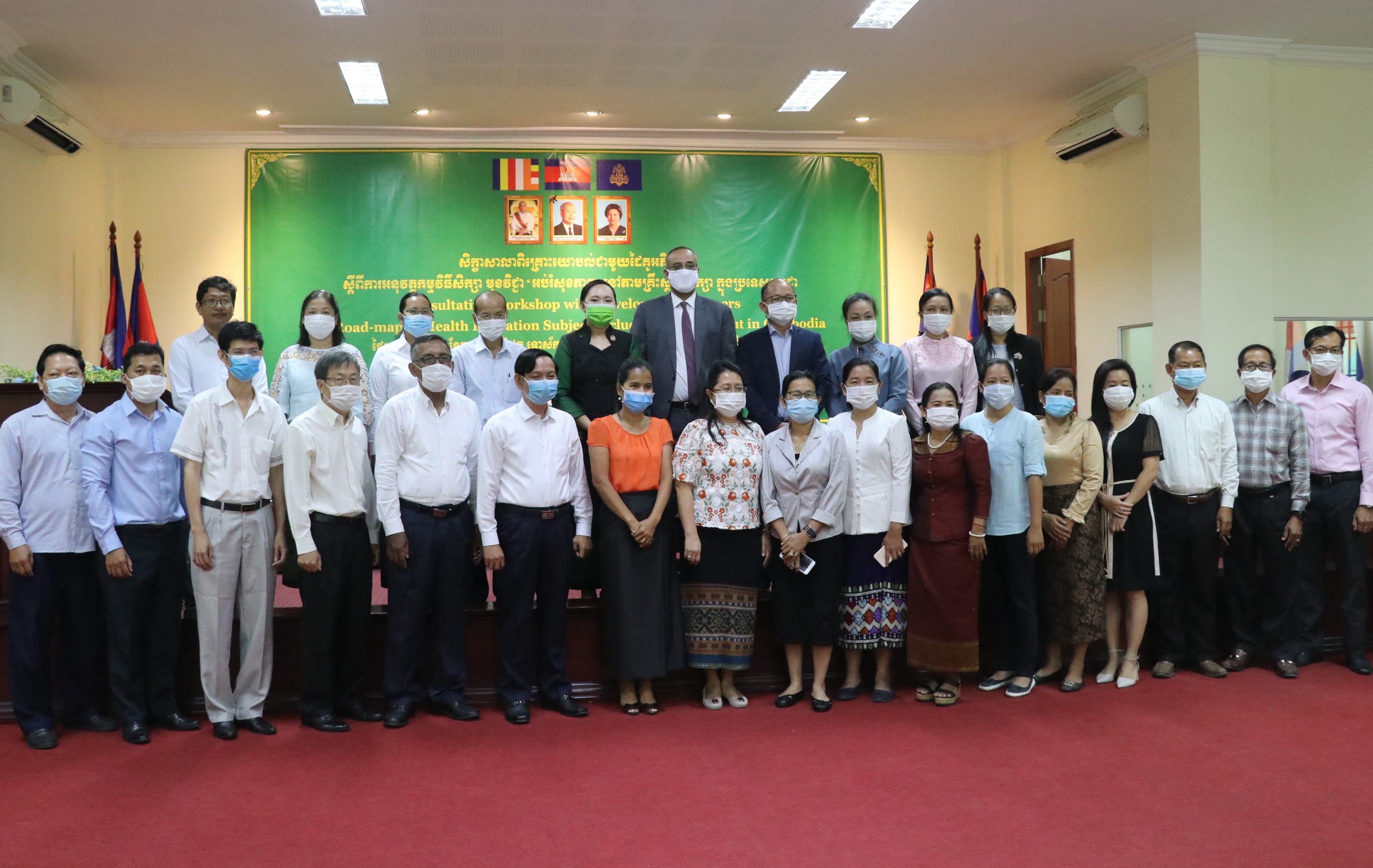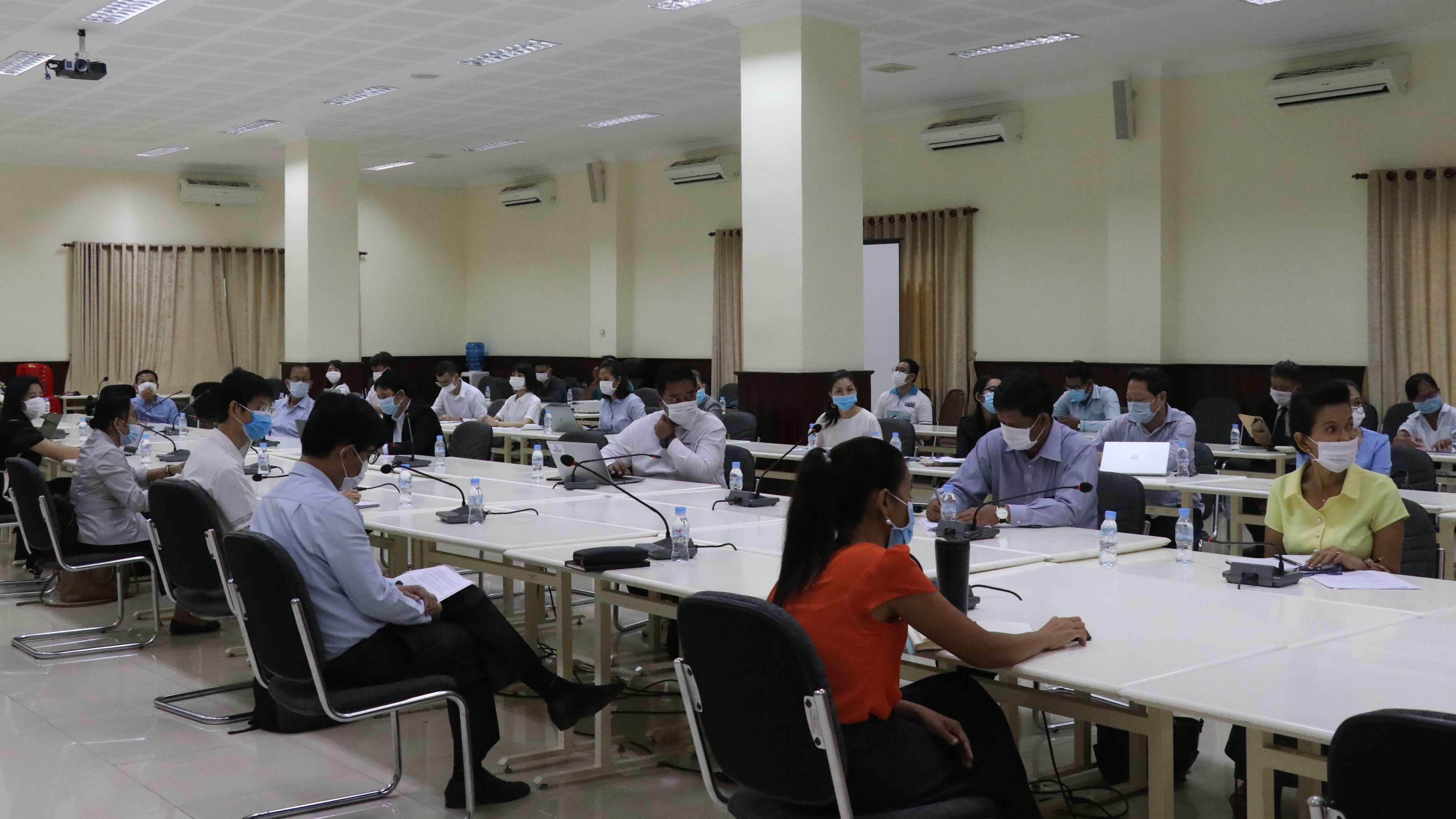Your Excellency Kim Sethany, Secretary of State, Ministry of Education, Youth and Sport
Other distinguished guests
Ministry counterparts
Development partner colleagues
Ladies and Gentlemen
------------------------
On behalf of UNFPA and UNICEF, I am delighted to be part of this very important consultation on the roll out of the health education subject of the curriculum. We are particularly pleased to be here with Her Excellency Kim Sethany, Secretary of State of the Ministry of Education, Youth and Sport, the senior leadership and colleagues of the Ministry, development partners and civil society representatives.
Approximately 700 million students worldwide comprising around 40% of total enrolled learners are still affected by COVID-19 as we speak according to UNESCO unable to physically attend schools and universities due to COVID-restrictions. The impact of school closures goes beyond the immediate loss of learning opportunities but also carry high social and economic costs for people especially the most vulnerable exacerbating existing disparities and inequalities within communities. For adolescents and youth particularly, school closures deprive them of important opportunities for growth, development and nurturing of their social capital. Schools help them foster their social networks and forge a sense of belonging and overall well-being. Long-term confinement and isolation from educational spaces will erode these social support networks young people very much need and rely on. UN The COVID-19 response is already putting immense stress on already stretched health systems around the world. It is disrupting the delivery of routine health services and information to young people, sharply limiting access to sexual and reproductive health services, disrupting immunization schedules, and cutting off young people’s access to health services. In Cambodia, to help reduce the risk of COVID-19 transmission, the Royal Government promoted physical distancing measures including school closures. This has impacted over three million children who are unable still to attend in-person schooling but rely on other online and distance learning methods where possible.

Cambodia has implemented a number of important reforms in the educational system over the years including reforming the school curriculum through the official endorsement of the 2016-2025 National Curriculum Framework of General and Technical Education incorporating health education and comprehensive sexuality education making Cambodia one of the progressive countries in the region. Health education and Comprehensive Sexuality Education (CSE) remain critical vehicles to entice societal change and long-term behavioral change in children and adolescents, reaffirmed as well in the November 2019 Nairobi Summit that marked the 25th anniversary of the International Conference on Population and Development (ICPD) held in 1994 in Cairo. In this regard, the Royal Government of Cambodia reaffirmed a strong and unwavering support for the full implementation of the unfinished business of the ICPD through a National Commitment in which Health/CSE was identified as one of the priorities to be taken forward. We are particularly pleased to note that the roll-out of the Health Education curriculum is part of the Government’s Post-Nairobi follow up actions.
Your Excellency
Ladies and Gentlemen
We are indeed at a very critical stage in the development and roll out of the health education subject in the curriculum including CSE so your presence here today is all the more important. The COVID-19 situation makes this endeavor the more pressing, as it is more important now than ever for children, adolescents and youth to be aware of their bodies and health to help reduce health and violence risks, which COVID-19 has further exposed them to.

We have come a long way and made great progress in the development of the health education subject, starting from syllabus, learning standards and currently textbooks, which represents an important investment in fostering young people’s knowledge, skills and decision-making to make responsible choices about their lives and bodies. This work will be of tremendous importance to their general health and wellbeing and help challenge and change broader gender norms and societal conventions. However, there remains a lot of work to be done in rolling-out this new subject to all schools nationally.
UNICEF and UNFPA are very pleased to be part of this important endeavor and in assisting the Ministry of Education Youth and Sports, particularly the School Health Department, in the development of the health education subject including CSE - both in terms of preliminary work on developing curriculum/syllabi; learning tools for the subject; and through mobilizing technical assistance to help the School Health Department coordinate the development of the textbooks for all grades.
In this regard, I would like to acknowledge the support mobilized through the Capacity Development Partnership Fund (CDPF) in assisting the School Health Department in this endeavor; and wish also to thank CDPF donors, including the European Union, Sweden, USAID and the Global Partnership for Education for their support.
Your Excellency
Ladies and Gentlemen
I would like to take a moment to reflect on couple of issues that we hope can help frame the discussions today.
Firstly, each component of the health education subject is of importance to the children youth and adolescents of Cambodia, as it will cover six core areas, including: (i) primary health care; (ii) comprehensive sexuality education; (iii) health and beliefs; (iv) health and economy; (v) health and environment; and (vi) mental health. Development and roll-out of health education and CSE is a significant undertaking, which will impact the learning environment involving both students and teachers in Cambodia, and considered a foundational investment for the attainment of several Sustainable Development Goals to ensure no child, adolescent and young person is left behind. As such a concerted effort from all partners is needed, which takes me to the second point.

Secondly, I wish to highlight the importance of following a coordinated approach within government and partners. Only by bringing together our expertise and resources can we provide a meaningful support to successfully roll out the health education subject in the curriculum. As such, it would important to discuss this morning the structural and financial barriers including those imposed by COVID-19 that have hindered progress in the roll-out of this subject impacting for example training of in-service teachers and printing and development of textbooks. A frank reflection on these issues could allow us to more clearly identify the bottlenecks and look at ways where we can bring our collective efforts and resources to bear in resolving them. Only through working together we can deliver health education successfully in Cambodia to expand access to health knowledge to the country’s young.
Finally, I would like to extend our heartfelt gratitude to Excellency Kim Sethany and the School Health Department who are leading and working tirelessly to ensure the program roll out is a success within the next few years. I congratulate Her Excellency Kim Sethany, for her support and foresight in taking the initiative to effectively roll out Health Education in Cambodia. I would also like to thank the Ministry of Education Youth and Sports as a whole for their unwavering support and commitment to addressing the needs of children and young people in Cambodia. I would like also to thank all representatives from line departments of MoEYS, UN agencies, development partners, CSOs for their firm support and presence here today.

On behalf of UNICEF and UNFPA, I would like to reaffirm our continued commitment to advancing young people’s rights and wellbeing in Cambodia, particularly their sexual and reproductive health and rights under the leadership of the Royal Government and other partners to ensure that no child and young person is left behind.
I wish you all fruitful discussions today and truly trust today’s workshop will help forge consensus and understanding of key challenges and opportunities towards the successful roll out of health education in the national curriculum.
Thank you!



